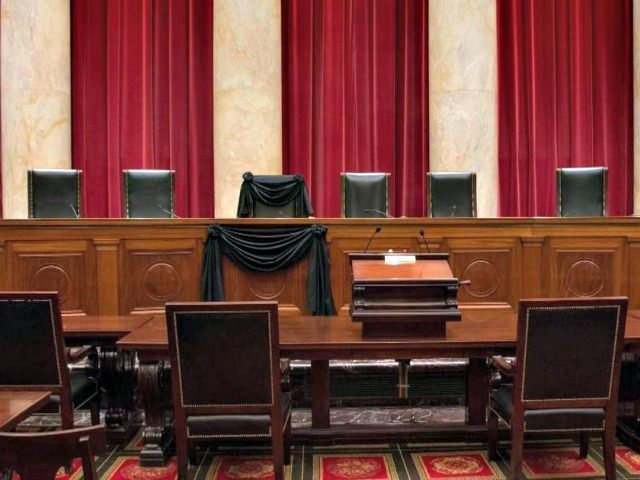“The Court must be living in another world. Day by day, case by case, it is busy designing a Constitution for a country I do not recognize.”
Justice Antonin Scalia, dissenting in Wabaunsee County v. Umbehr (1996)
The American flag flew at half staff over pro-life and pro-abortion protesters outside the Supreme Court this week, while inside the most important abortion case in decades was being reviewed. No one inside or outside the Court could have anticipated that this case, with far-reaching implications, would be missing the vital input of Justice Antonin Scalia.
In the weeks since his death, I have been rereading some of Justice Scalia’s opinions and dissents and I realize that he was not alone in his assessment that the Supreme Court has constructed a new, very different Constitution from what was drafted in Philadelphia. Our nation’s Founders would not recognize it either.
Not only has what Justice Scalia called the “imperial judiciary” given us a new Constitution, it has given us a new government. No longer “of the people,” our government is one that stands above us decreeing which of us are people. It determines who is worthy of protection and who may be terminated and sold as spare parts.
The Supreme Court’s Roe v. Wade decision created this radical break in the very nature of our country. With the Roe ruling, the court altered not just the words of the Constitution, but the principles upon which it was based.
Justice Scalia is famed for his adherence to the Constitution as it was written. An “originalist,” he considered our country’s foundational document to be “enduring,” not “living.” He didn’t see himself as an editor of the Constitution, but an interpreter; a judge, not a legislator. His was a position of humility.
Tragically, too many of our leading jurists have succumbed to the temptation to rewrite the Constitution in their own image. Rather than be stalwart defenders of our nation’s founding principles, Supreme Court justices have acted as novelists, repeatedly submitting the Constitution to rewrites.
And in declaring the Constitution to be a “breathing” document, the court has sown the wind.
We reap the whirlwind.
In my book, Abolishing Abortion, I write that the Supreme Court’s enabling of the killing of innocents has altered the very foundation of our government. The consequences of this have been grave – almost 60 million aborted babies and countless devastated mothers, fathers, and family members.
Pope Saint John Paul II noted in his encyclical “The Gospel of Life” that when governments engage in granting rights to stronger parties and denying them to weaker ones:
The State is no longer the ‘common home’ where all can live together on the basis of principles of fundamental equality, but is transformed into a tyrant State, which arrogates to itself the right to dispose of the life of the weakest and most defenseless members.
We have become that tyrant state.
Our Founders wrote in the Declaration of Independence that “that all men are created equal, that they are endowed by their Creator with certain unalienable Rights, that among these are Life, Liberty and the pursuit of Happiness.” They also wrote that “Governments are instituted among Men” for the purpose of securing those rights.
The Supreme Court, however, has not secured those rights, it has trod them under foot. In so doing, it has subverted the very concepts upon which our nation was founded.
When the court legalized abortion, it changed our government from one that protects unalienable rights to one that dispatches them as it sees fit. It now sees itself as supreme, period.
As Justice Scalia repeatedly noted, however, our Founders did not intend for such a seizure of power.
One of the most important aspects of the limited government our Founders created was that it would act as a safeguard, as much as possible, against man’s pride and, consequently, his ability to aggregate power. The Justices of the Supreme Court, though, are men and women who are as susceptible to pride as any other human. And when presented with unopposed opportunities to elevate themselves, they have seized them.
Justice Scalia, in his inimitable style, noted this phenomenon in his dissent in Planned Parenthood v. Casey, the Supreme Court’s 1992 decision that upheld Roe v. Wade:
No government official is “tempted” to place restraints on his own freedom of action, which is why Lord Acton did not say “Power tends to purify.”
That lack of restraint now runs rampant in our judiciary, corrupting our nation and destroying lives.
The passing of Justice Scalia is tragic, both for his wonderful family and our beleaguered nation. He was a public servant with a profound understanding of our Republic. Above all, he was a humble man. I saw that firsthand in my conversations with him over the years. If our government is to be restored to its rightful footing, we will need more like him.
Fr. Frank Pavone is the National Director of Priests for Life.

COMMENTS
Please let us know if you're having issues with commenting.